The Toshiba RC100 SSD Review: Tiny Drive In A Big Market
by Billy Tallis on June 14, 2018 9:00 AM ESTAnandTech Storage Bench - Light
Our Light storage test has relatively more sequential accesses and lower queue depths than The Destroyer or the Heavy test, and it's by far the shortest test overall. It's based largely on applications that aren't highly dependent on storage performance, so this is a test more of application launch times and file load times. This test can be seen as the sum of all the little delays in daily usage, but with the idle times trimmed to 25ms it takes less than half an hour to run. Details of the Light test can be found here. As with the ATSB Heavy test, this test is run with the drive both freshly erased and empty, and after filling the drive with sequential writes.
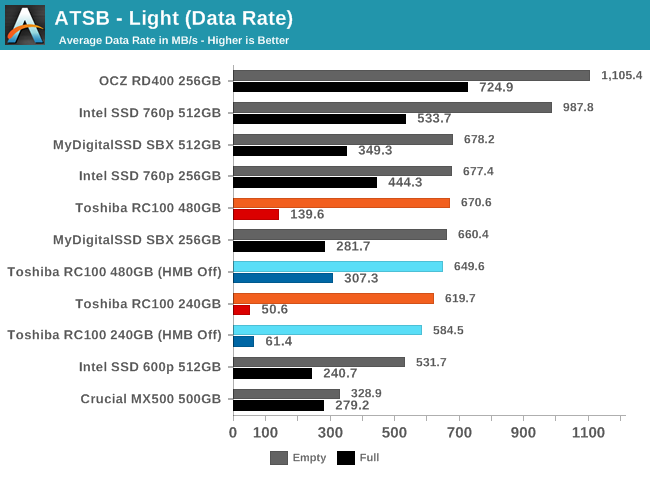
Once again the 240GB Toshiba RC100 exhibits very poor performance overall when the drive is full, and the 480GB doesn't do particularly well in that situation either. But for the more typical case of running the Light test on a drive that isn't full, both RC100s are competitive with other low-end NVMe SSDs and much faster than SATA drives.
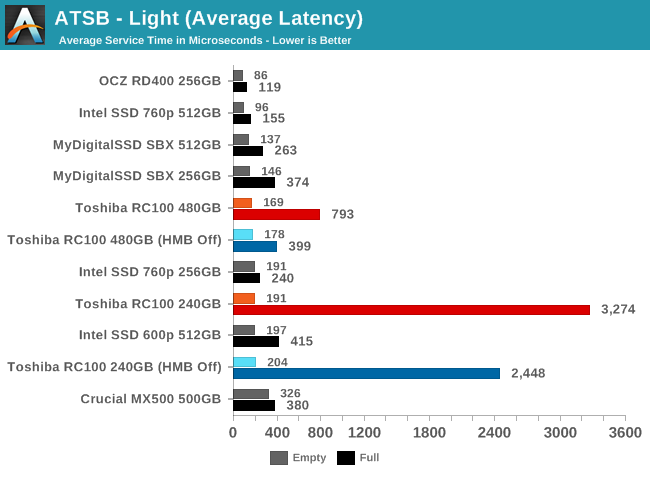
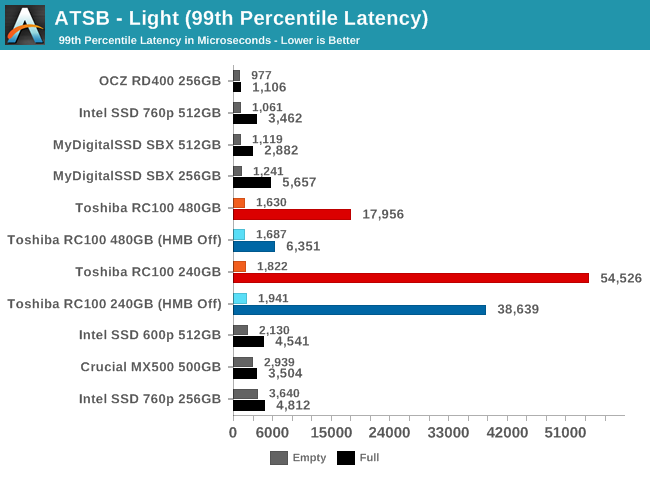
Most of the low-end NVMe SSDs show substantially higher latency when running the Light test on a full drive, so the RC100's results aren't quite as extreme an outlier. The RC100 is actually better off with HMB off for the full-drive runs of this test, possibly because the overhead of the extra PCIe communication isn't worthwhile when the cache isn't going to be of much use.
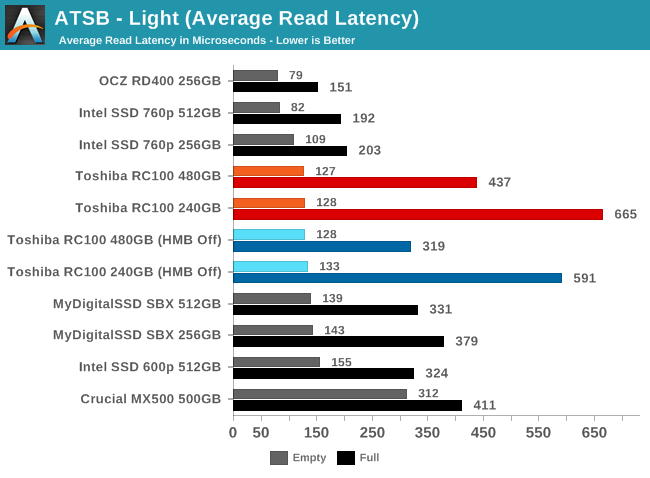
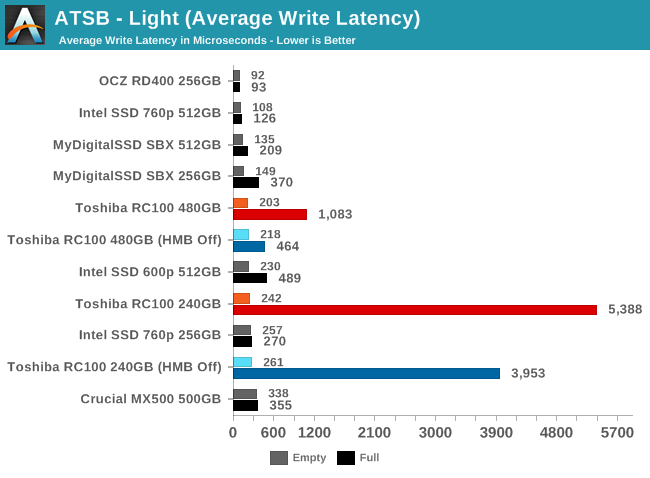
Average read and write latencies are both competitive for the RC100's empty-drive test runs, and the full-drive read latencies are high but aren't extreme outliers. It's the write latency that really causes problems for the RC100 when it is full.
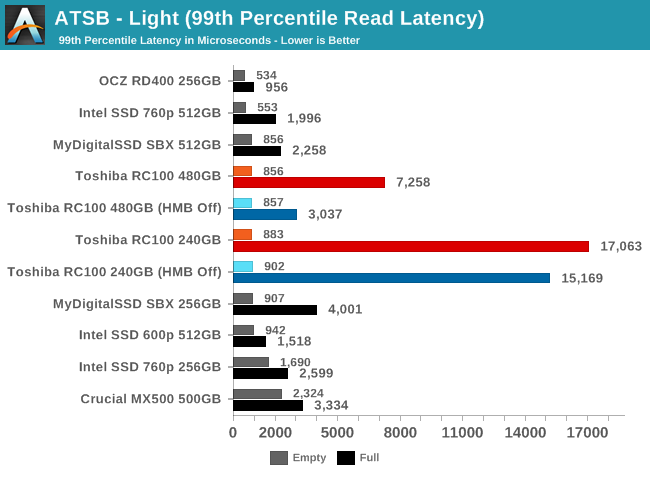
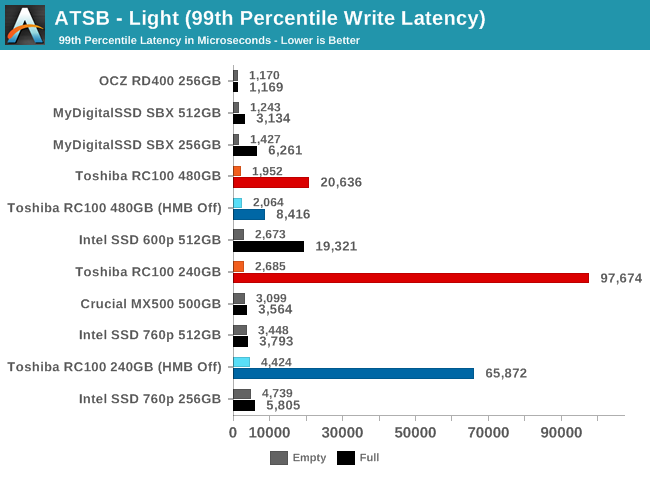
The 99th percentile read and write latency scores show similar results to the averages, but more prominently highlight the drives that are having trouble—which is mostly just the RC100, though the 600p's 99th percentile write latency is pretty bad, too.
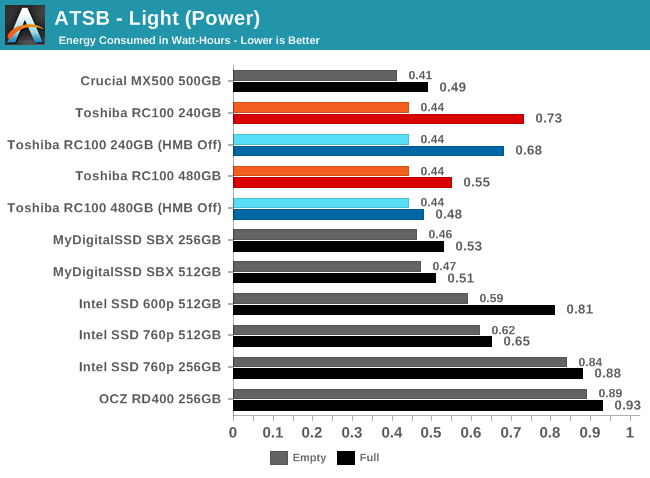
The Toshiba RC100 doesn't quite manage to beat the Crucial MX500 SATA drive for energy usage on this test, but it's first-place among its NVMe competition for the empty-drive test runs, and isn't unreasonably power-hungry even when it is performing poorly.










62 Comments
View All Comments
XabanakFanatik - Thursday, June 14, 2018 - link
Seriously? We get this instead of the 970 Pro or 905p review? Did anyone actually care about this drive?Billy Tallis - Thursday, June 14, 2018 - link
Personally, I find doing a review like this to be a lot more interesting than testing an overpriced flagship product where I know going into it that the conclusion will be that a drive 1/2 or 2/3 the price is just as good for realistic use cases. It's interesting to explore the current state of the art for high-end tech, but it's more interesting to explore new tech in the context of something that might also be a sane purchase.XabanakFanatik - Thursday, June 14, 2018 - link
I'm not sure how interest explains why you've reviewed this two days after it shipped but 7 weeks after you posted the 970 Evo review, there is no 970 pro review. Every other inferior review website posted the pro and evo reviews simultaneously, so Samsung must have sent you both drives around the same time.And Seriously, this is more interesting than reviewing the first optane refresh 905p?
close - Thursday, June 14, 2018 - link
They're usually very late with most reviews. Except Intel ones.Ostensibly because they want to provide the best information out there.
Samus - Thursday, June 14, 2018 - link
Need a review of a 970 Pro? Read the 970 Evo review and assume it’s moar better for proportionately moar money.bananaforscale - Monday, July 9, 2018 - link
Not proportionately. Flagship products *never* have a price that's proportional to performance.artifex - Thursday, June 14, 2018 - link
You already know a bazillion other sources for a 970 Evo review, so you're beating this guy up for being different? He says doing this review is more interesting for him, so no wonder he did it.Also, since you're calling Anandtech an inferior review site, he's hardly likely to change just for you, now.
XabanakFanatik - Thursday, June 14, 2018 - link
I was saying every other review site was inferior, yet they posted 970 PRO reviews the same time as 970 EVO reviews. My issue with Anandtech was the sole posting of the 970 EVO review and no 970 PRO review now for over 7 weeks.Nobody tests like Anandtech. I'm sad that the halo drives aren't a priority for Billy, since the market for them is actually really big.
lmcd - Thursday, June 14, 2018 - link
Most people I know look at the 970 EVO as the highest price drive they'll consider. I almost didn't even consider it.XabanakFanatik - Thursday, June 14, 2018 - link
I can think of a half dozen people I know that would have never considered the 900 Pro drive at the previous price point that bought one after Samsung's mysterious price drop at launch of the 970 series. Lopping off 20-25% of MSRP tends to work pretty well to sell a new generation that was previously priced too high.